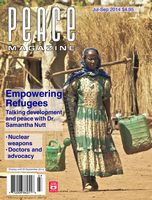
Peace Magazine Jul-Sep 2014, page 13. Some rights reserved.
Search for other articles by Janet Nicol here
In October last year, 188 UN member states voted to oppose the continued US trade embargo on Cuba. While the Obama government has eased up on some of the embargo’s restrictions, many food and medicine products are still banned from export.
“It is illegal, outdated and inhuman,” says Julio Fonseca, a language professor from Cuba at York University, in a recent interview. “I don’t believe (US President Barack) Obama will end the blockade, although he, like no other, has a unique opportunity to make history.”
Fonseca favors the US lifting its decades-old embargo against Cuba. The policy hasn’t impacted on Cuba’s political regime, many critics argue, and only harms ordinary Cubans. “Lifting the embargo would give Cuba an opportunity to trade freely with other nations for the first time in 52 years,” Fonseca says, “which would in turn better the quality of life of its people.”
When 188 countries in the UN voted last October to oppose the embargo—this for the 22nd year—some delegates spoke of its crushing impact on a poorer nation. Only the US and Israel opposed the motion. Three countries abstained.
“The relaxing of travel restrictions, which the ‘freest’ nation of the world has imposed on its citizens, is certainly a positive step,” Fonseca believes, referring to Obama’s decision in 2011, “but insufficient to preserve Americans’ right to travel anywhere they choose.”
Cubans have gained universal education and health care since Fidel Castro led Communist revolutionaries in an armed takeover in 1959 but democratic freedoms have yet to be established. Supporters of the embargo argue that the policy provides leverage for the US to negotiate political and economic concessions for the Cuban people. Yet in reality, the blockade has fortified the Cuban government, not undermined it. Opening up trade and tourism may encourage a Cuban move toward democratic governance.
Canadians have a different relationship with Cuba, many visiting as tourists and volunteers. Some Americans have ignored the embargo, traveling to Cuba through other countries, and more are now taking government-licensed “people to people” tours.
A recent survey by Friendly Planet travel company in Philadelphia reveals changing attitudes of Americans. The company questioned 423 clients who visited Cuba and found 88 per cent supported ending the embargo. Before their trip, half of respondents viewed the Cuban government as “a repressive communist regime that stifles individuality and creativity.” After visiting, only 19 percent agreed with that sentiment. Peggy Goldman, head of the agency, says, “These tours are 100 per cent educational exchanges. Cubans learn a lot about us too—it’s a two way street.”
A majority of survey respondents would travel to Cuba again. Many were surprised by the openness and friendliness of Cubans, their entrepreneurial drive, and the vibrancy of the arts and cultural scene. “Cuba has the most effective health organization in the world, with great doctors who go all over the world—but they can’t get Band Aids,” Goldman observes. There is also limited or no internet access on the island.
There is pressure on the president to end the embargo. Some American conservatives are favoring an end, hoping for increased trade. The bitterness toward the Castro regime, expressed by many Cuban-Americans in Florida, is diminishing. Indeed, Obama won almost 50 per cent of the Cuban-American vote in his 2012 re-election, despite easing travel restrictions. As well, Charlie Crist, a Republican-turned-Democratic candidate to become Florida’s governor, opposes the embargo, having previously supported it. Cuba no longer poses a threat to American security. The Cuban government is playing a positive role in the peace process between Colombia’s government and the FARC guerrillas.
Still, Obama requires the support of Congress to end the blockade and a significant number of Democrats and Republicans maintain the status quo on this issue, believing they are sending the right message to an authoritarian regime. It’s a fair but inconsistently applied action, for the US does trade with other authoritarian countries.
Kathy Ingerson, a health care administrator in Minneapolis, traveled this year to Cuba for the first time on a licensed-tour. “Cuba offers high quality, low cost medical procedures like Lasik eye surgery to people who take ‘medical tours’ to Cuba,” she says. “But of course that’s off limits to American citizens.”
Alison Bodine, a Vancouver peace activist from the US who has traveled openly on an American passport to Cuba several times notes, “About 76 percent of Cubans have lived their entire life under the blockade and revolution.” Cubans in their twenties have vitamin deficiencies that could lead to vision problems as they get older, she says. This is because of an improper diet, due to the blockade of food.
Also, Bodine says essential medicines manufactured in the US are not accessible to Cubans. When asked, “Will ‘unbridled’ capitalism take over if the embargo ends?” Bodine replies that “the revolution will only grow. The sense of community, commitment, and belief, won’t go away.”
Janet Nicol is a freelance writer and teacher in Vancouver. She traveled to Cuba in the 1990s with BC teachers.

Peace Magazine Jul-Sep 2014, page 13. Some rights reserved.
Search for other articles by Janet Nicol here